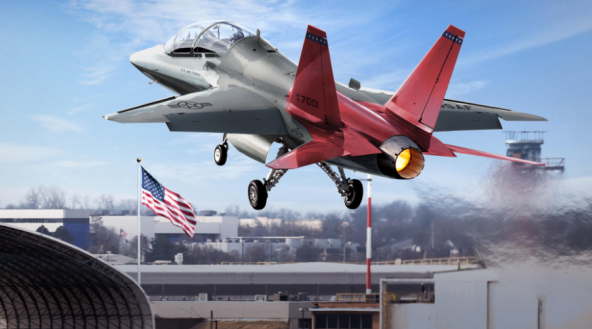
T-7A
The U.S. has decided to defer buying the first annual lot of the production version of the Boeing T-7A Red Hawk beyond fiscal 2024, budget documents released on March 13 show.
No procurement funding for the single-engine jet trainer appears in the fiscal 2024 budget request rolled out by the U.S. Defense Department.
In April 2022, U.S. Air Force released a long-term spending plan that included a $322 million line item to buy the first 14 T-7As in fiscal 2024, with the first aircraft expected to be delivered in October 2024.
But a problem discovered late last year prompted the Air Force to defer the launch of low rate initial production (LRIP) to the second half of 2024. By that timeline, it appeared possible for Boeing to start production during the fiscal year, which ends on Sept. 30. But the budget documents show the delay will push the LRIP kickoff to fiscal 2025.
The problem, which was first reported by Air Force Times, involved a glitch in the flight control software and escape system.
Now the Air Force’s plan calls for maintaining the status quo in 2024, with no increase in research and development funding on the fixed price engineering and manufacturing development contract awarded to Boeing in September 2018. Boeing has already reported forward losses worth $1.14 billion on the T-7A program.
The fiscal 2024 program will continue “to accept delivery of five test aircraft and ground training devices,” according to a DOD report on fiscal 2024 program acquisition costs by weapon system.
The impact of the delay on a series of planned milestones was not immediately clear. Boeing referred questions to the U.S. Air Force, which did not respond to a request for comment.
As of April 2022, the Air Force planned to complete the research, development test and evaluation phase in September 2023. The initial operational test and evaluation was scheduled to start in May 2024.
The Air Force plans to buy 351 T-7As, including the first five test aircraft. No flyaway unit cost of the T-7A is available, but last year the Air Force projected the gross weapon systems cost, including initial spares, would be about $23 million each.
Neither Boeing or Air Force officials have warned of any pending delays for the program. On March 7, Boeing announced that the T-7A had been tested to 150% of its load limits.
“Aircrew can have confidence in this advanced trainer,” Boeing said in a tweet about the T-7A test milestone.
